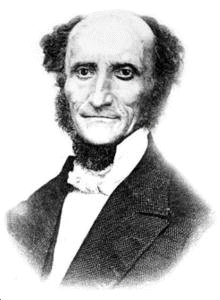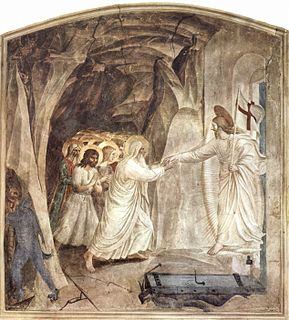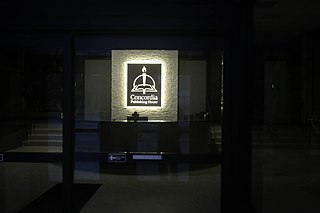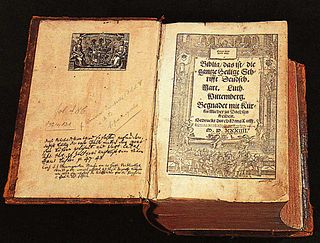Related Research Articles
Sola scriptura, meaning by scripture alone, is a Christian theological doctrine held by some Protestant Christian denominations, in particular the Lutheran and Reformed traditions of Protestantism, that posits the Bible as the sole infallible source of authority for Christian faith and practice.

The Lutheran Church—Missouri Synod (LCMS), also known as the Missouri Synod, is a traditional, confessional Lutheran denomination in the United States. With over 1.8 million members, it is the second-largest Lutheran body in the United States. The LCMS was organized in 1847 at a meeting in Chicago, Illinois, as the German Evangelical Lutheran Synod of Missouri, Ohio, and Other States, a name which partially reflected the geographic locations of the founding congregations.

Carl Ferdinand Wilhelm Walther was a German-American Lutheran minister. He was the first president of the Lutheran Church–Missouri Synod (LCMS) and its most influential theologian. He is commemorated by that church on its Calendar of Saints on May 7. He has been described as a man who sacrificed his homeland, his health, and nearly his life for the freedom to speak freely, to believe freely, and to live freely, by emigrating from Germany to the United States.

Biblical inerrancy is the belief that the Bible "is without error or fault in all its teaching"; or, at least, that "Scripture in the original manuscripts does not affirm anything that is contrary to fact". Some equate inerrancy with biblical infallibility; others do not. The belief is of particular significance within parts of evangelicalism, where it is formulated in the "Chicago Statement on Biblical Inerrancy".

In Christian theology, justification is God's righteous act of removing the condemnation, guilt, and penalty of sin, by grace, while, at the same time, declaring the unrighteous to be righteous, through faith in Christ's atoning sacrifice.

The Concordia Theological Seminary is a Lutheran seminary in Fort Wayne, Indiana. It offers professional, master's degrees, and doctoral degrees affiliated with training clergy and deaconesses for the Lutheran Church–Missouri Synod.

Concordia Seminary is a Lutheran seminary in Clayton, Missouri. The institution's primary mission is to train pastors, deaconesses, missionaries, chaplains, and church leaders for the Lutheran Church–Missouri Synod (LCMS). Founded in 1839, the seminary initially resided in Perry County, Missouri. In 1849, it was moved to St. Louis, and in 1926, the current campus was built.

Jaroslav Jan Pelikan Jr. was an American scholar of the history of Christianity, Christian theology, and medieval intellectual history at Yale University.

The Evangelical Lutheran Free Church is a confessional Lutheran denomination based in Germany and Austria. It currently consists of 1,300 members in 17 congregations. The ELFK maintains a seminary for the training of pastors in the city of Leipzig.
This is a sub-page for the Justification (theology) page.

The Lutheran Churches of the Reformation (LCR) is an association of Lutheran congregations. The LCR has its roots among groups of Lutherans that broke with the Lutheran Church–Missouri Synod (LCMS) in the middle of the 20th century, and was formally incorporated in 1964. Church services are generally traditional and reverent in the style of the mid-1900s conservative Christians.

In Protestant Christianity, the relationship between Law and Gospel—God's Law and the Gospel of Jesus Christ—is a major topic in Lutheran and Reformed theology. In these religious traditions, the distinction between the doctrines of Law, which demands obedience to God's ethical will, and Gospel, which promises the forgiveness of sins in light of the person and work of Jesus Christ, is critical. Ministers use it as a hermeneutical principle of biblical interpretation and as a guiding principle in homiletics and pastoral care. It involves the supersession of the Old Covenant by the New Covenant and Christian theology.

Concordia Publishing House (CPH), founded in 1869, is the official publishing arm of the Lutheran Church–Missouri Synod (LCMS). Headquartered in St Louis, Missouri, at 3558 S. Jefferson Avenue, CPH publishes the synod's official monthly magazine, The Lutheran Witness, and the synod's hymnals, including The Lutheran Hymnal (1941), Lutheran Worship (1982), and Lutheran Service Book (2006). It publishes a wide range of resources for churches, schools, and homes and is the publisher of the world's most widely circulated daily devotional resource, Portals of Prayer. Its children's books, known as Arch Books, have been published in millions of copies. Concordia Publishing House is the oldest publishing company west of the Mississippi River and the world's largest distinctly Lutheran publishing house.

The Luther Bible is a German language Bible translation from Hebrew and ancient Greek by Martin Luther. The New Testament was first published in September 1522 and the complete Bible, containing the Old and New Testaments with Apocrypha, in 1534. Luther continued to make improvements to the text until 1545. It was the first full translation of the Bible into German which made use of the original Hebrew and Greek texts, not just the Latin Vulgate translation. However, according to the updated 2017 translation of the Luther Bible published by the Evangelical Church in Germany noted that "Luther translated according to the Latin text." Luther did not speak Greek, Hebrew or Aramaic well enough and relied heavily on other scholars for assistance, namely philologists Erasmus and Melanchthon. The text basis of the New Testament was the Greek Translation recently published by the Dutch Catholic Humanist Erasmus of Rotterdam called the Novum Instrumentum omne.

Lutheran orthodoxy was an era in the history of Lutheranism, which began in 1580 from the writing of the Book of Concord and ended at the Age of Enlightenment. Lutheran orthodoxy was paralleled by similar eras in Calvinism and tridentine Roman Catholicism after the Counter-Reformation.
Concordia Lutheran Seminary is a Lutheran seminary situated on the north bank of the North Saskatchewan River in Edmonton, the provincial capital of Alberta, Canada. The seminary is located near the campus of Concordia University of Edmonton. The seminary location currently houses the Alberta - British Columbia District Corporation Office of Lutheran Church - Canada.
Robert Kolb is professor emeritus of Systematic Theology at Concordia Seminary, St. Louis, Missouri, and a world-renowned authority on Martin Luther and the history of the Reformation.

Robert David Preus was an American Lutheran pastor, professor, author, and seminary president.

Lutheranism is one of the largest branches of Protestantism that identifies with the theology of Martin Luther, a 16th-century German monk and reformer whose efforts to reform the theology and practice of the Roman Catholic Church launched the Protestant Reformation. The reaction of the government and church authorities to the international spread of his writings, beginning with the 95 Theses, divided Western Christianity. During the Reformation, Lutheranism became the state religion of numerous states of northern Europe, especially in northern Germany, Scandinavia and the then Livonian Order. Lutheran clergy became civil servants and the Lutheran churches became part of the state.

Luther's canon is the biblical canon attributed to Martin Luther, which has influenced Protestants since the 16th-century Protestant Reformation. While the Lutheran Confessions specifically did not define a canon, it is widely regarded as the canon of the Lutheran Church. It differs from the 1546 Roman Catholic canon of the Council of Trent in that it rejects the deuterocanonical books and questions the seven New Testament books, called "Luther's Antilegomena", four of which are still ordered last in German-language Luther Bibles to this day.
References
- ↑ Concordia Theological Seminary, Rev. Dr. Harold Herman Buls (1920-1997), accessed 22 March 2016
- ↑ The Sermon Notes of Dr. Harold Buls, accessed 22 March 2016
- ↑ Some Homiletical Maxims, accessed 22 March 2016
- ↑ Exegetical Guidelines, accessed 22 March 2016
- ↑ Buls, H. H., "Luther's Translation of Colossians 2:12" in Concordia Theological Quarterly, Volume 45, Numbers 1-2, January–April 1981